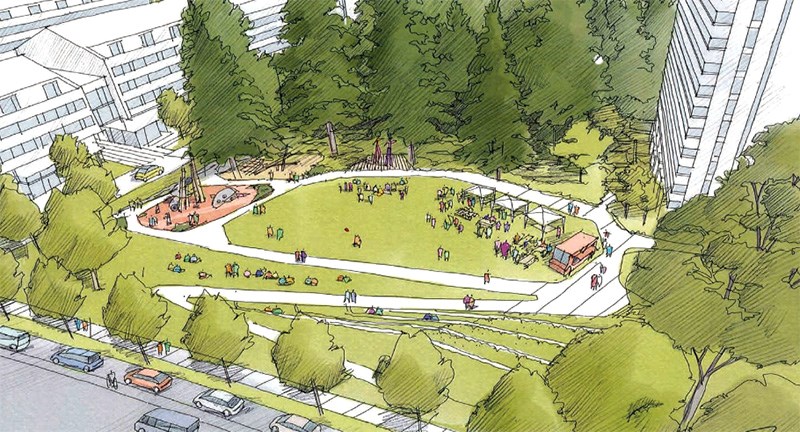A massive redevelopment of Port Moody’s Woodland Park townhouse community will take its first step towards possible realization Tuesday when the project is presented to the city’s community planning advisory committee (CPAC).
The project, by Vancouver-based Edgar Development, would bring approximately 2,000 new homes, in a mix of buildings ranging from four to 26 storeys, to Port Moody’s Seaview neighbourhood on Cecile Drive. Units would comprise condos and rentals, with about 325 of them to be rented at below-market rates in partnership with BC Housing and a non-profit operator.
Currently, the 23-acre site is occupied by 200 rental townhomes in 19 low-rise buildings that were built in the 1960s.
In its proposal, Edgar is also pitching more green space, including a 1.5-km multi-use trail around the perimeter of the L-shaped property. It would also build a 5,000-sq. ft. community centre, retail spaces and a 5,000-sq. ft. daycare that would accommodate 37 children.
The developer would also provide a new traffic signal at Clarke Street and Barnet Highway to improve access and introduce electric bicycle and possible car share programs to ease congestion.
Edgar said it would phase construction to minimize disruption to current residents. The company plans to build the project in seven phases, with full completion scheduled for 2034.
For the project to proceed, the company requires an amendment to Port Moody’s official community plan as well as rezoning to allow for its commercial, public and institutional components, along with the highrises, which would be clustered at the site's southeast corner, off Cecile Drive near Clarke Road.
CPAC is made up of Port Moody residents representing various neighbourhoods as well as members with expertise in areas like architecture, landscape architecture and engineering, along with representatives from the business and arts communities, construction industry and people with a background in environmental issues and accessibility challenges. The committee provides feedback to applicants as well as council and the city’s planning and development department about proposed land use changes.
Feb. 25, Port Moody council voted to continue scheduling the committee’s monthly meetings in the Inlet Theatre, where they can be livestreamed and recorded for subsequent viewing, rather than moving them to the smaller Brovold meeting room. It also asked staff to report back on the feasibility of recouping the approximately $7,000 annual cost to record those meetings through a surcharge added to fees the city charges for development applications.
André Boel, the city’s general manager of planning and development, said those fees are based on what it costs the city to process applications, including staff time and engineering reviews. He said there’s no specific charge to cover the cost of presenting applications to CPAC.
Coun. Steve Milani said he doesn’t think Port Moody taxpayers should bear that cost as developers “make a profit” from their projects, although Coun. Diana Dilworth said an additional charge could be “a hardship” on families looking to build a small project like a laneway home to house an aging relative.
“I would view this as an unfair tax,” she said, adding the cost of the meetings is “worthwhile” for the “enhanced engagement” they offer.
Coun. Zoe Royer said having a video record of CPAC meetings helps keep city governance transparent but Mayor Rob Vagramov said the theatrical environment of council chambers can politically charge committee members’ consideration of applications.



